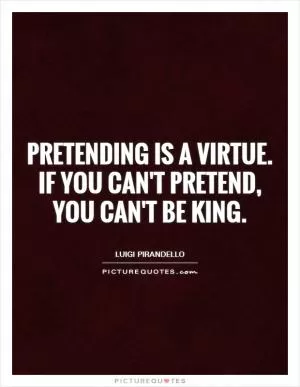Anyone can be heroic from time to time, but a gentleman is something you have to be all the time

Anyone can be heroic from time to time, but a gentleman is something you have to be all the time
Luigi Pirandello, the renowned Italian playwright and novelist, is often associated with the concept of identity and the complexities of human nature. In his works, he delves deep into the inner workings of the human mind, exploring the masks we wear and the roles we play in society. One of the recurring themes in Pirandello's works is the idea of heroism and gentlemanly behavior.The quote "Anyone can be heroic from time to time, but a gentleman is something you have to be all the time" encapsulates the essence of Pirandello's philosophy on character and morality. In Pirandello's world, heroism is often portrayed as a fleeting moment of bravery or selflessness, while being a gentleman requires a consistent adherence to a code of conduct and a sense of honor.
In Pirandello's plays, such as "Six Characters in Search of an Author" and "Henry IV," the characters grapple with questions of identity and morality. They are often faced with moral dilemmas and must make difficult choices that test their integrity and sense of self. In these works, Pirandello explores the idea that true heroism lies not in grand gestures or acts of valor, but in the everyday actions and decisions that define a person's character.
The concept of being a gentleman in Pirandello's works goes beyond mere politeness or social etiquette. It is about embodying a set of values and principles that guide one's actions and interactions with others. A gentleman, according to Pirandello, is someone who is honest, respectful, and compassionate, even in the face of adversity.












 Friendship Quotes
Friendship Quotes Love Quotes
Love Quotes Life Quotes
Life Quotes Funny Quotes
Funny Quotes Motivational Quotes
Motivational Quotes Inspirational Quotes
Inspirational Quotes